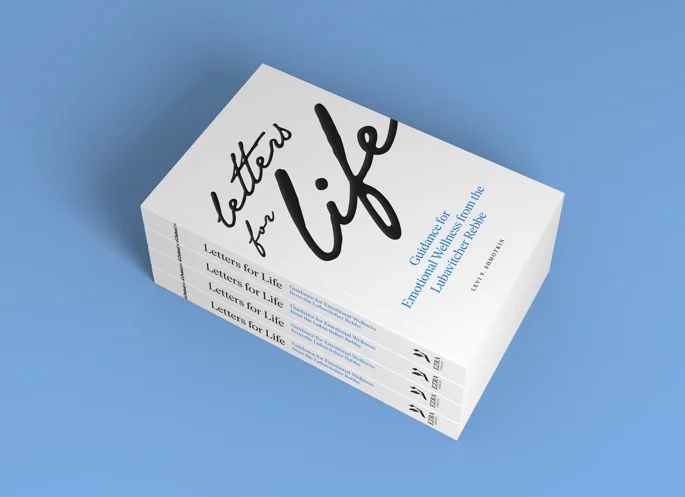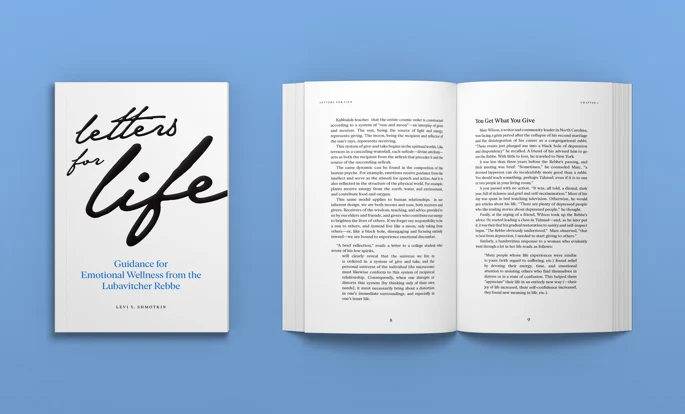|
Getting your Trinity Audio player ready...
|
New book illuminates the Rebbe’s practical counsel for overcoming life’s challenges with purpose and resilience
By: Bronya Shaffer
Recent decades have seen leaps in our focus on human emotions and a commensurate surge of data, analyses and advice. It might seem that every nuance of emotional wellbeing has already been addressed. But a new beacon emerges with the new release of Letters for Life: Guidance for Emotional Wellness from the Lubavitcher Rebbe—Rabbi Menachem M. Schneerson, of righteous memory.
Over a period of some 50 years, tens of thousands of men and women of every age turned to the Rebbe for his wisdom, in writing and in person, seeking his advice for problems big and small. To create Letters for Life, author Levi Shmotkin sifted through more than 20,000 of the Rebbe’s correspondences and 1,500 interviews to identify the core principles found in the guidance he gave. The result, its author writes, is no “anthology of abstract hypotheses,” but a collection of practical tools, delivering the Rebbe’s message on many of life’s challenges.
The Rebbe’s approach is elegant in its simplicity. It is a steadfast focus on moving forward and upward, imbuing every moment with meaning and consistent growth. The goal is not “happily ever after”; it is about the moment before us and the choice we can make right now, a conscious and deliberate one. And from this intentionality emerges the great joy of fulfillment. The Rebbe’s path was less about the promise of a rose garden, and more about planting our own roses, dealing with the thorns with equanimity that comes from faith, while nurturing an endless optimism.
The book provides a refreshing departure from the conventional dwelling on pathologies or trauma, as important as that may be at times. (The author is emphatic that this work is not a replacement for necessary medical advice.) Instead it offers profound and simple directives, such as: look outward. Discover the transformative power of acts that better the lives of others. Uncover the emotional resilience that comes from altruism and community. “It is time… to give, and to give generously,” a young man was told, after writing to the Rebbe of his dark ruminations. “The opportunities are many. And the need is great.” Here is a roadmap for cultivating not just personal well-being but a brighter world for all of G‑d’s children.
Shmotkin tells us of a mother in distress, an escapee from Communist Russia. After a seemingly endless series of displaced persons’ camps, she finally finds herself in the United States, trying in vain to find work to support her ten children. In a private audience, she shared with the Rebbe her feelings of despair. The Rebbe’s response was surprising: dance. Dance at as many weddings as you can. There were, at the time and in that neighborhood, many young couples without parents and family nearby. She could bring joy to them. And she did, for decades.

The book’s topics are divided into two primary sections. Part I focuses on what the Rebbe saw as the necessary foundation one needs for life, referred to in the book as the “Essentials for a Healthy Life.” Part II delves into the Rebbe’s approach to overcoming darkness, with chapters covering human “discontent,” “bad moods,” and “worry.”
For my own family, like so many others, the Rebbe’s message was a salve of consolation and hope. When my father was killed in a car accident, my then 16-year-old sister asked him how to make sense of her world—suddenly turned upside down. There was nary a grief counselor in sight back then, and we hadn’t yet heard of Kubler-Ross. The Rebbe, with palpable compassion—and no doubt sensing my sister’s innate leadership qualities—offered the teenager a path forward: your father was a teacher, he said, go forth along that path. And so was born a lifelong educator. Today, five decades later, she stands at the helm of the organization she founded, Bat Mitzvah Club International. (If you haven’t heard of it, look it up!)
Back then, we didn’t know the stages of grief we were meant to navigate; we knew only that the Rebbe had shined a light for us, revealing a path forward. (Needless to say, the Rebbe addressed my mother and each of my siblings individually; my sister is but one illustration.)
Never disapproving, the Rebbe’s response to people’s worries and fears was to remind them of our Father in Heaven. After my father’s death, my mother was fearful of moving to crime-ridden New York City. With a gentle smile, the Rebbe suggested that it wouldn’t be overly difficult for G‑d to care for one more resident of the city; he was underscoring that she was not alone.
Indeed, the book records that often, in response to someone expressing concern about a life situation, the Rebbe would remind them that the feeling is not unique, others have been there. In a private audience with the Rebbe when I was expecting my first child, I suddenly began to cry, choking on my fear and anxiety about the birth. The Rebbe—who along with his wife, Rebbetzin Chaya Mushka, personally bore the pain of childlessness—smiled and validated my concerns, telling me that millions of women were at that very moment experiencing the same feelings. He nudged me out of my own little island of anxiety and, instead of feeling disconnected in my fear, helped me feel at one with all those other expectant women across the planet.
The anecdotes brought in Letters for Life are plentiful, and the excerpts of the Rebbe’s letters include direct quotes. Shmotkin divides the book into categories, neatly packaging them into chapters, and completes each with a section of “Takeaways.” The book is extensively footnoted; I like to be able to explore further on any particular quotation, and Shmotkin provides that generously. Shmotkin’s contribution is not simply in his curation of letters and responses, but in the thoughtful contextualization he provides.
It has been three decades since his passing, but more people benefit from the Rebbe’s wisdom than ever before. Thanks to this book, many more will be able to draw from his treasury of strength and hope, learning how to better give, how to better love, and how to better lead a life that is as meaningful as it is joyful.





